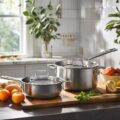Choosing the right cookware is essential for any home cook or professional chef. The material of your cookware affects not only the quality of your food but also your cooking experience. In this article, we will explore the different types of cookware materials, their benefits, and how to choose the best one for your needs.
1. Stainless Steel Cookware
Stainless steel cookware is a popular choice for many home cooks and professional chefs. It is known for its durability, resistance to rust and corrosion, and ability to maintain a sleek appearance over time. Stainless steel cookware often features an aluminum or copper core to enhance heat conductivity.
- Pros: Durable, non-reactive, dishwasher safe.
- Cons: Can be expensive, may require polishing to maintain shine.
2. Cast Iron Cookware
Cast iron cookware is renowned for its heat retention and even heating properties. It is ideal for slow cooking, frying, and baking. Cast iron cookware can be found in two forms: enameled and traditional (bare) cast iron.
- Pros: Excellent heat retention, versatile, long-lasting.
- Cons: Heavy, requires maintenance to prevent rust, not dishwasher safe.
3. Nonstick Cookware
Nonstick cookware is a favorite for its ease of use and cleaning. It features a coating that prevents food from sticking, making it ideal for cooking delicate items like eggs and fish. However, nonstick coatings can wear off over time, so it is important to handle them with care.
- Pros: Easy to clean, requires less oil for cooking, lightweight.
- Cons: Coating can wear off, not suitable for high-heat cooking, may release harmful chemicals at high temperatures.
4. Copper Cookware
Copper cookware is known for its excellent heat conductivity, allowing for precise temperature control. It is often lined with stainless steel or tin to prevent reactions with food. Copper cookware is prized by professional chefs for its performance and aesthetic appeal.
- Pros: Exceptional heat conductivity, beautiful appearance, precise temperature control.
- Cons: Expensive, requires regular polishing, can react with acidic foods if not properly lined.
5. Aluminum Cookware
Aluminum cookware is lightweight and conducts heat well. It is often anodized to prevent it from reacting with acidic foods and to increase its durability. Anodized aluminum cookware is a popular choice for its affordability and performance.
- Pros: Lightweight, good heat conductivity, affordable.
- Cons: Can react with acidic foods if not anodized, prone to scratching and denting.
6. Ceramic Cookware
Ceramic cookware is a newer addition to the market, known for its nonstick properties and eco-friendliness. It is made from natural materials and is free from harmful chemicals. Ceramic cookware offers a non-toxic cooking experience and is aesthetically pleasing.
- Pros: Non-toxic, nonstick, easy to clean, attractive design.
- Cons: Can be less durable than other materials, may require careful handling to prevent chipping.
FAQ
What is the best cookware material for everyday use?
Stainless steel is often considered the best cookware material for everyday use due to its durability, non-reactive nature, and ease of maintenance.
Is nonstick cookware safe to use?
Nonstick cookware is generally safe to use as long as it is not overheated. Avoid using metal utensils that can scratch the coating and opt for lower heat settings to maintain the integrity of the nonstick surface.
How do I maintain my cast iron cookware?
To maintain cast iron cookware, regularly season it with oil to create a natural nonstick surface and prevent rust. Avoid using soap to clean it; instead, use hot water and a stiff brush.
Can I use metal utensils with my cookware?
It depends on the material of your cookware. Metal utensils can be used with stainless steel and cast iron but should be avoided with nonstick and ceramic cookware to prevent scratching.
What is the advantage of copper cookware?
Copper cookware offers excellent heat conductivity and precise temperature control, making it ideal for tasks that require accurate heat management.









